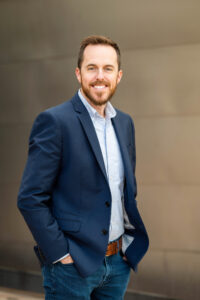I still remember reading the headlines in March 2020 that Disney World was closing. For “two weeks,” one of the world’s most recognizable theme parks was shutting down in response to COVID-19. The happiest place on earth would become one of the most desolate. As a native of Florida, I couldn’t remember a scenario like this. It’s no small matter when one of the country’s largest economic drivers completely ceases operations, and I realized then that the coronavirus and it’s economic, political, social, and interpersonal fallout would be no small matter, either.
Around the same time, Denver Institute was preparing to host an event with healthcare professionals about the country’s opioid crisis and what a faithful Christian response could look like (a prescient conversation in hindsight). As one of the last events hosted on the UC Health campus in Aurora, Colo., prior to the implementation of public health restrictions, it felt like we were preparing for a trek up Mt. Everest: who knew what the next days, weeks, or months would hold? How do you begin to prepare with so much uncertainty? Would all of us make it back?
An Uncertain Future
When it became apparent that “fourteen days to slow the spread” was slightly optimistic, I began asking the same questions that most people were asking around that time: What does this mean for my work? What does this mean for my family? What does this mean for all of us collectively?
I couldn’t recall a time when so many individuals’ work contexts changed so quickly. Restaurants become takeout counters. Cashiers shouted from behind plastic partitions. Parents became quasi-teachers. Together we navigated working from home, moved meetings online, and (bewilderingly) stocked up on toilet paper. As an organization dedicated to helping people integrate their faith and work, the question for Denver Institute became: How do we help our community make sense of all this?
In the absence of public events, 5280 Fellowship activities, and donor gatherings, our team had a unique opportunity to think, brainstorm, and write that isn’t often afforded with a full programming calendar. We blogged about how the pandemic was affecting different industries and different workers. We hosted webinars with pastors, healthcare professionals, and artists to create a space for reflection and encouragement. We developed a course for The Faith & Work Classroom on the gospel and our work – whatever that might look like. We talked with our friend Philip Yancey for The Faith & Work Podcast about faith and science and how to love our neighbors during a pandemic.
As the weeks ticked by and the COVID cases ticked up, uncertainty gave way to frustration. Our collective resolve, if there ever was such a thing, splintered along geographic and political lines. We mourned loved ones lost, cheered for hospital staff, and spent too much time scrolling through social media. We looked for answers to make sense of our grief, confusion, and disappointment, but few were found.
Rediscovering Lament
For Denver Institute, we wanted to create space to rediscover the somewhat lost biblical truths of lament. As my colleague, Ryan Tafilowski, wrote at the time, “For biblical writers, the feeling of helplessness in the face of open-ended, unintelligible pain was simply a fact of life in a fallen world, and lament was one expression of an emotionally sophisticated and realistic spirituality, as much as joy or wonder or gratitude or longing.” Through our blog posts, podcasts, and online webinars throughout the spring, we aimed to provide a space to ask questions without seeking answers. We sought to weep with those who wept and mourn with those who mourned.
Light in the Darkness
Thankfully, the despair modeled by Job and his friends, David writing in the Psalms, and Christ’s words on the cross are not final. As Ryan wrote at the time, “no matter how deeply buried or hidden, all true lament is done in hope, because it holds our pain before God.” Even with the pandemic raging, even with our normal programming put on hold or canceled completely, even in the midst of so much economic uncertainty and personal anxiety, we can join with the saints in saying “...he has not despised or abhorred the affliction of the afflicted, and he has not hidden his face from him, but has heard when he cried to him” (Psalm 22:24).
While so much around us was changing, we focused on the fundamentals of faith and work, the foundational elements that don't require a commute or a cubicle. If work really is a way to love God, serve our neighbors, and demonstrate the gospel as the masthead on our website says, what does that mean when your dining room doubles as an office? How can we help the small business owner love their employees and customers from six feet away? How can we serve ten million people who are out of work?
We didn’t (and don’t) have all the answers, but we were determined to make the best of an unfortunate set of circumstances. As we thought about the impact of COVID-19 on our programming and on our community, we knew that things wouldn’t look the same as we had planned earlier in the year. Yet we also knew that a little redirection could go a long way.

